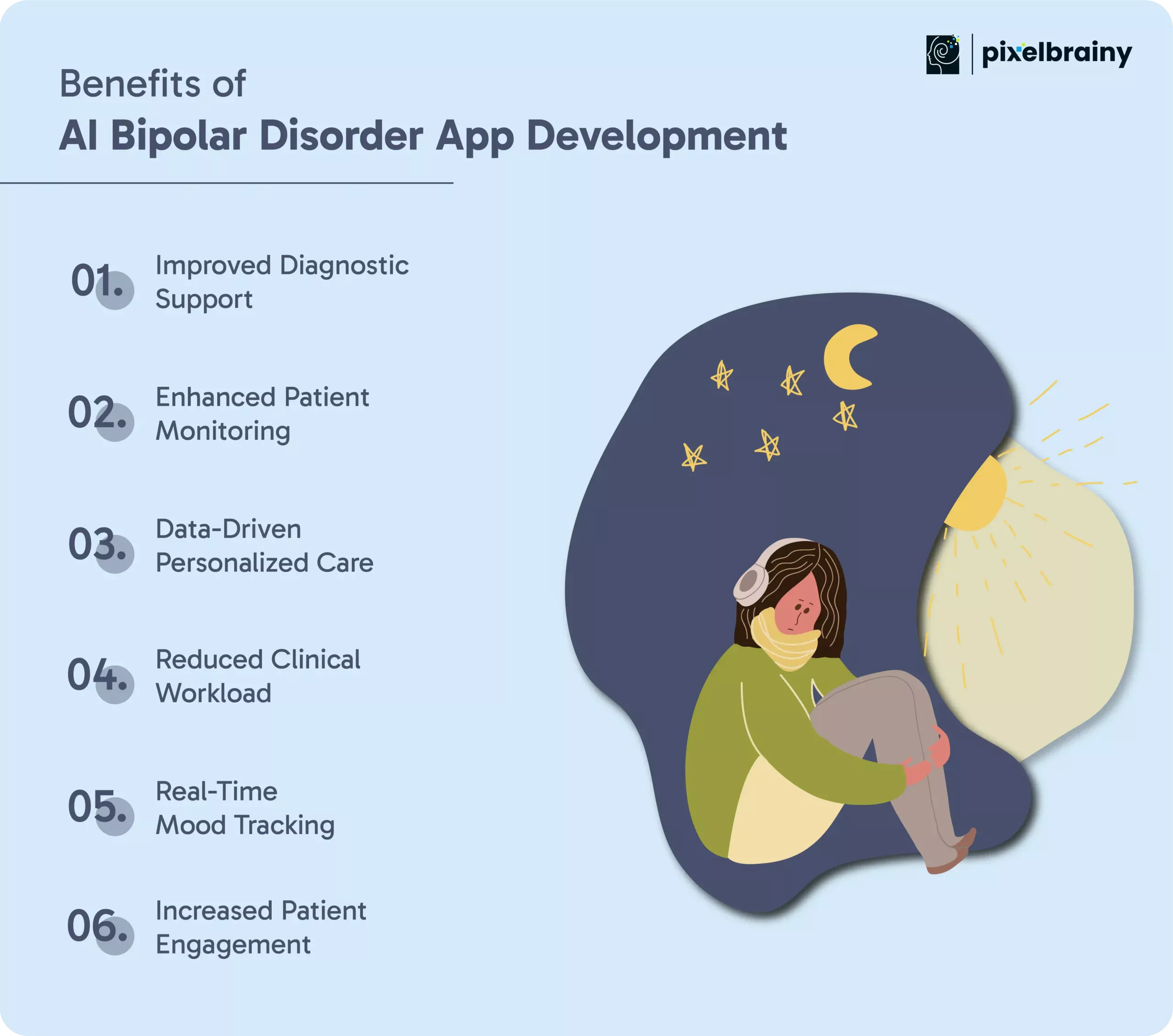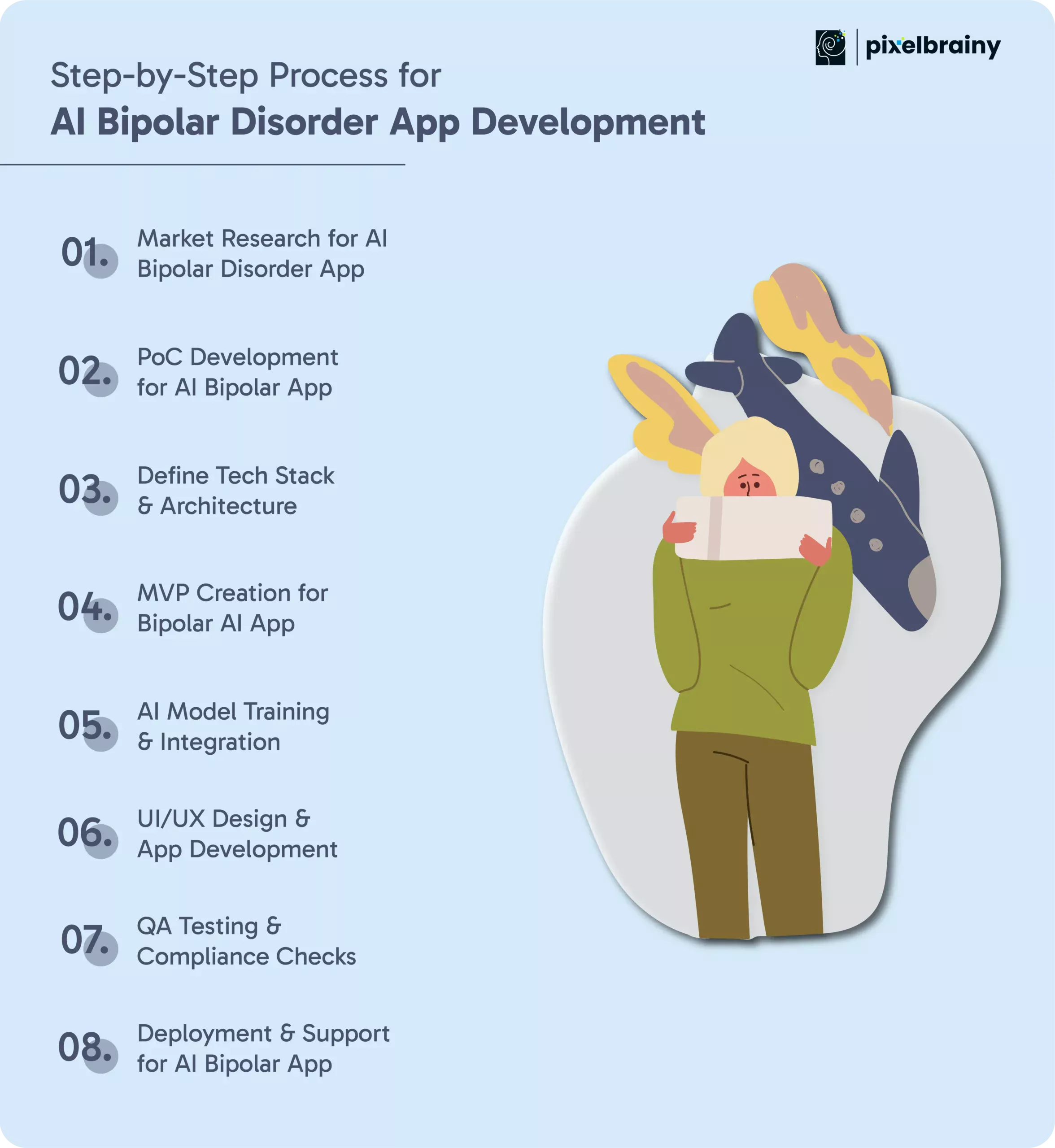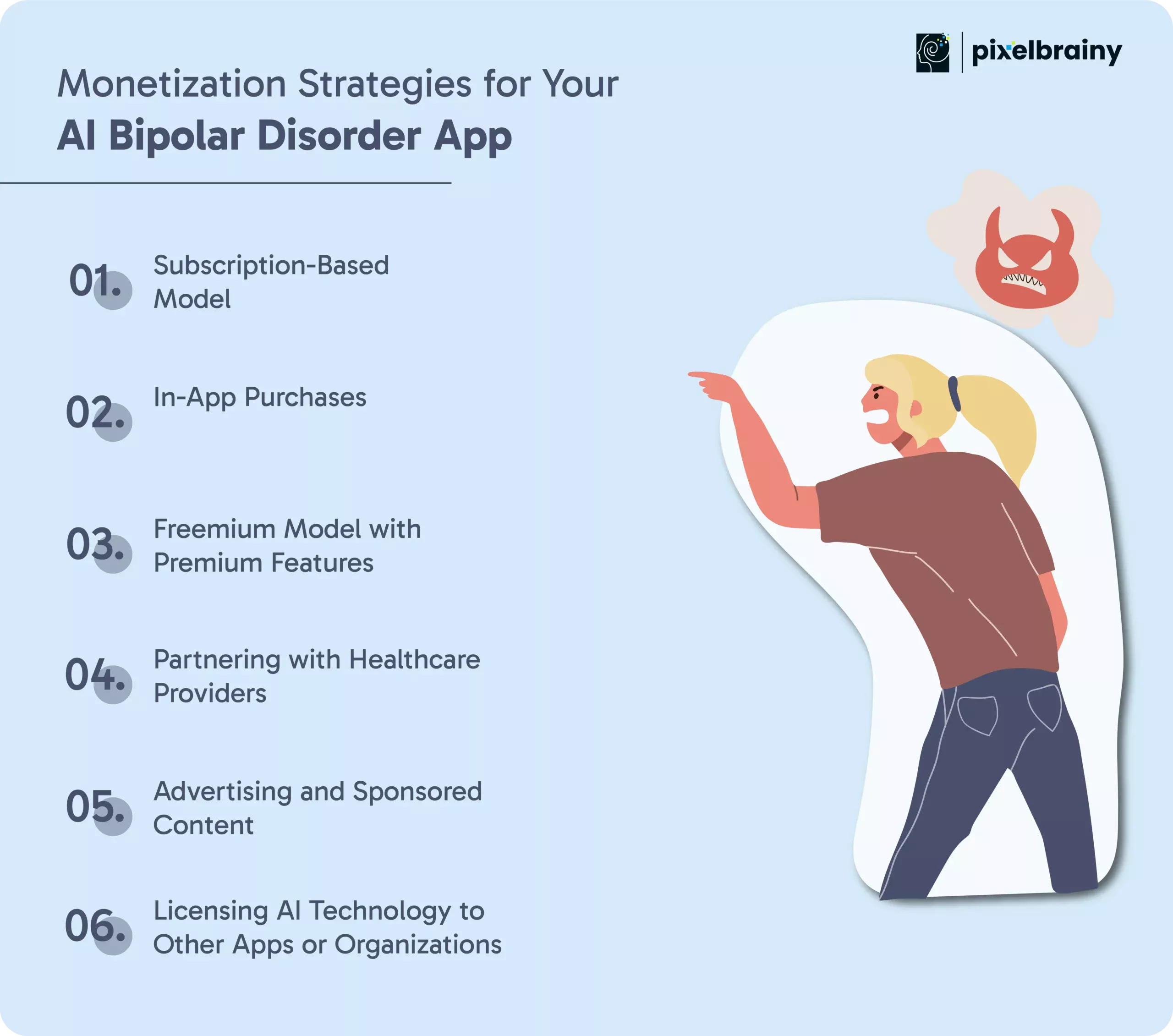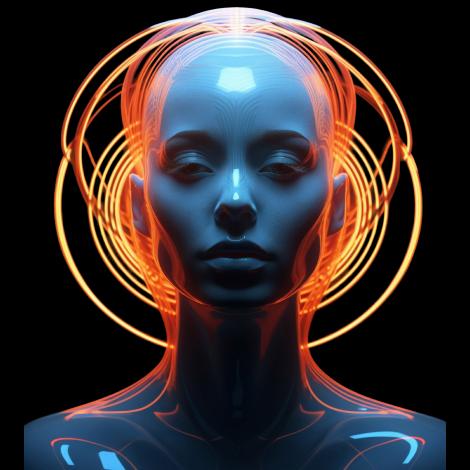Bipolar disorder is a complex mental health condition characterized by extreme mood swings that deeply affect a person’s overall well-being. While talking about traditional management methods, they rely heavily on self-reporting, sporadic clinical visits, and manual mood tracking, which often leads to irregular monitoring and delayed interventions.
Yes, you are going right. Numerous existing bipolar disorder apps provide basic mood logging and reminders. But they fail to deliver personalized insights or predictive support. Such generic apps usually lack real-time analysis, significant engagement, and adaptive treatment recommendations, restricting their effectiveness for patients and caregivers.
Here, the AI bipolar disorder app development enters the landscape. By leveraging artificial intelligence (AI) technologies like machine learning and natural language processing, AI-powered bipolar disorder monitoring apps offer continuous mood monitoring, early episode prediction, and customized care guidance. These innovations improve accuracy and empower patients and clinicians with actionable insights.
Curious to know how to build one? Let’s break down the features, development steps, and cost to build AI bipolar disorder app that truly makes a difference. Whether you are a health tech entrepreneur, product manager, or mental health professional, this guide will provide the knowledge to create AI bipolar disorder app that manages the real challenges of bipolar disorder management.
Artificial intelligence and mental health are meeting to create solutions that open new boundaries for healthcare businesses and startups alike, primarily in the domain of bipolar disorder care. As awareness increases and healthcare systems turn toward digital-first solutions, businesses can develop AI bipolar disorder apps that deliver both a social impact opportunity and a scalable tech investment.
Below are more key reasons to know:
The global bipolar disorder treatment market is anticipated to hit $4.88 billion by 2030, expanding at a CAGR of 2.7%. This indicates robust and sustained demand for new treatment models for diagnosis, monitoring, and long-term support gaps.
Simultaneously, the global mental health apps market is booming, predicted to extend from $6.52 billion in 2024 to $23.80 billion by 2032, at a remarkable CAGR of 18.0%.
An AI-powered bipolar disorder app bridges both markets, presenting clinical utility and commercial potential.
Many conventional mental health apps offer generic tools that fail to adapt to bipolar-specific challenges like irregular mood cycles, missed early warning signs, and one-size-fits-all self-care suggestions. This creates a clear market void that can be filled by developing a tailored AI-powered app with predictive intelligence and dynamic care personalization.
By integrating an AI model for bipolar disorder diagnosis, your app can perform more than just tracking symptoms. It can detect early manic or depressive patterns, offer personalized content based on user behavior, and support clinicians with real-time insights. This functionality notably reduces misdiagnosis, delays in treatment, and dropout rates.
Investing in AI bipolar disorder app development finds a way to create multiple revenue streams, like B2C freemium models with premium upgrades, B2B partnerships with clinics and mental health providers, and integrations with insurance platforms and EHR systems.
With boosted funding in digital health and growing support for mental health parity laws in the US, the ecosystem is promising for launching purpose-driven, compliant, and scalable AI-based mental health solutions. Businesses can make AI bipolar disorder app and drive the future of digital mental healthcare.
Making an AI-powered bipolar disorder app proposes multiple advantages that benefit businesses by improving user experience, enhancing clinical relevance, and boosting market potential.
Here are the key benefits perfectly demonstrated:

You can create AI bipolar disorder app that can thrive by choosing a competent combination of features that address patient requirements and clinical workflows. These bipolar disorder app features enhance user experience and improve app adoption, retention, and business viability.
Here are the essential features to include when you develop an AI-powered bipolar disorder app:
| Feature | Description & Business Value |
| AI-driven Mood Tracking | Continuous monitoring using AI to detect mood patterns and early warning signs, enabling timely interventions and insights |
| Symptom Journaling | User-friendly logging of daily symptoms and triggers, providing rich data for AI analysis and personalized care |
| Personalized Insights and Recommendations | Tailored advice powered by AI increases user engagement and supports better management of bipolar disorder |
| Integration with Wearable Devices | Syncs physiological data (e.g., heart rate, sleep) from wearables, adding objective monitoring to complement self-reports |
| Natural Language Chatbot for Mental Health Support | Provides empathetic, on-demand conversational support, helping users manage stress between therapy sessions |
| Crisis Detection and Alert System | Detects potential crisis signs and triggers alerts to users or caregivers for immediate intervention |
| Appointment Scheduling and Reminders | Simplifies booking and sends automated reminders, improving adherence to therapy and medication schedules |
| Secure In-App Messaging with Therapists | Enables confidential communication between patients and clinicians, strengthening trust and care continuity |
| Daily Mental Wellness Check-ins | Promotes regular mental health reflections, supporting habit formation and self-awareness among users |
| Progress Tracking Dashboards | Visualizes symptom trends and treatment efficacy, motivating users and aiding clinicians in decision-making |
| Medication Tracking and Reminders | Helps users adhere to medication plans, reducing missed doses and improving treatment outcomes |
| Support Community/Forum Access | Facilitates peer support and community engagement, boosting emotional well-being and app retention |
| Multi-User Access (e.g., for Caregivers) | Allows caregivers to monitor and support patients, enabling collaborative care without compromising privacy |
| HIPAA/GDPR-Compliant Data Privacy Controls | Ensures compliance with health data regulations, building user trust through data protection |
| Analytics Dashboard for Clinicians | Provides clinicians with actionable insights, streamlining care coordination and improving clinical outcomes |

How to build AI Bipolar Disorder app? A successful AI-powered bipolar disorder management app development demands following a systematic approach that fuses thorough research, technical expertise, and user-centric design.
Below is a comprehensive roadmap sketching each critical stage, its purpose, key activities, and estimated timelines.

Time Estimate: 3–4 weeks
Time Estimate: 4–6 weeks
Also Read: MVP vs Prototype vs Proof of Concept
Time Estimate: 2–3 weeks
Time Estimate: 8–10 weeks
Time Estimate: 10–12 weeks (can overlap with MVP phase)
Time Estimate: 10–12 weeks
Time Estimate: 4–6 weeks
Time Estimate: Ongoing
Also Read: A Comprehensive Guide To AI Mobile App Development
The cost to develop AI mental health app, including an AI bipolar disorder app, can range between $20,000 and $200,000+, relying on the app’s complexity, features, and compliance requirements.
Whether planning to build AI bipolar disorder app from scratch or upgrade an existing platform with AI capabilities integration, it’s important to understand the cost-driving elements before committing to your budget.
This section breaks down what businesses need to know about pricing, so you can make smarter investment decisions when planning to create AI Bipolar Disorder app or evaluating the ROI of an AI-powered bipolar disorder monitoring system.
| App Type | Estimated Cost Range | Inclusions |
| MVP (Startup-ready) | $20,000 – $50,000 | Core AI features, mood tracking, basic journaling, minimal design |
| Advance-Level | $50,000 – $120,000 | Custom UI/UX, wearable sync, chatbot, data dashboards, HIPAA compliance |
| Enterprise App | $120,000 – $200,000+ | Real-time AI analytics, clinician dashboards, multi-user access, smart alerts |
Note: Mental health app development costs vary widely based on app complexity, from a basic MVP to a fully featured enterprise-grade AI bipolar disorder app.
| Factor | Impact on Cost |
| AI Model Complexity | More advanced models (e.g., for real-time mood prediction) require more data and tuning |
| Data Privacy & Compliance | HIPAA/GDPR adherence can increase legal, development, and security expenses |
| Design Depth (UI/UX) | Custom UI for mental wellness requires iterative testing and inclusive design |
| Wearable Integration | Adds backend development and testing costs for syncing real-time data |
| Chatbot or NLP Interface | Increases cost depending on conversation complexity and mental health NLP training |
| Development Team Location | US-based teams are more expensive than Eastern Europe or India-based developers |
| Post-launch Support & AI Updates | Continuous retraining and technical support add to long-term ownership costs |
| Target Audience | Recommended Budget | Why |
|---|---|---|
| Startups & MVP Builders | $20,000 – $60,000 | Focus on validating product-market fit with minimal but effective AI |
| Mental Health Clinics | $60,000 – $120,000 | Require AI insights, therapist dashboard, secure chat, and data privacy |
| Healthcare Enterprises | $120,000 – $200,000+ | Need scalable backend, multi-role access, compliance, and advanced analytics |
Note: Different stakeholders should allocate budgets according to their needs, from startups focusing on MVPs to healthcare enterprises requiring advanced features.
Also Read: AI App Development Cost: From MVPs to Full-Scale AI App
You can build AI bipolar disorder app to be robust and effective by carefully choosing a combination of cutting-edge AI tools, secure backend technologies, and user-centric frontend frameworks. Leveraging the right tech stack ensures accurate diagnosis and real-time monitoring. Also, it supports the broader adoption of AI in mental health care, guaranteeing data privacy and compliance with healthcare regulations.
Below is an analysis of essential tools and technologies that power AI mental health app development.
| Category | Tools & Technologies | Explanation |
| AI & Machine Learning | TensorFlow, PyTorch, IBM Watson, Google Cloud AI | Frameworks and platforms for building and training AI models, natural language processing, and predictive analytics for mood and symptom detection |
| Backend Development | Node.js, Django, Flask, Ruby on Rails | Scalable server-side frameworks that handle data processing, API creation, and integration with AI services |
| Frontend Development | React Native, Flutter, Angular | Cross-platform frameworks for building responsive, intuitive user interfaces and smooth user experiences |
| Databases | MongoDB, PostgreSQL, Firebase | Secure, scalable databases for storing user data, mood logs, and AI model outputs with real-time sync capabilities |
| Wearable & IoT Integration | Fitbit SDK, Apple HealthKit, Google Fit APIs | Tools for integrating wearable devices to collect continuous physiological and behavioral data |
| Security & Compliance | OAuth 2.0, JWT, AES Encryption, AWS KMS | Technologies ensuring secure authentication, encrypted data storage, and HIPAA/GDPR compliance |
| Cloud Platforms | AWS, Microsoft Azure, Google Cloud | Cloud service providers offer scalable infrastructure, AI tools, and compliance certifications |
| AI Model Management | MLflow, Labelbox, AWS SageMaker | Platforms for data labeling, model versioning, training lifecycle management, and deployment monitoring |
| DevOps & CI/CD | Jenkins, GitLab CI, Docker, Kubernetes | Tools for automated testing, deployment, and container orchestration to maintain app reliability and updates |
Revenue opportunities in AI bipolar disorder app development require a strategic balance between profitability, user trust, and accessibility.
Here are key monetization strategies, backed by real-world examples and best practices, that businesses can leverage to build sustainable income streams:

Many leading mental wellness apps like Calm and Headspace thrive on subscription revenue. Monthly or yearly subscriptions open full access to AI-powered mood tracking, personalized therapy content, and advanced analytics.
Revenue Estimate: 50-70% of total app revenue, providing stable and predictable income
User Benefit: Promotes long-term loyalty and continuous usage
Users can buy additional features, like specialized therapy modules, improved AI coaching, or additional mood journaling tools. This pay-as-you-go approach attracts users who want to customize their experience without committing to a subscription upfront. Apps like BetterHelp successfully use this model to upsell value-added services.
Revenue Estimate: 10-20% of revenue, driven by engaged users opting for upgrades
User Benefit: Offers customization without subscription commitment
A free version with basic features and premium paid upgrades with features like advanced mood disorder management can attract a broad user base and convert active users into paying customers. This model balances accessibility with monetization.
Revenue Estimate: 5-15% of revenue from premium feature upgrades
User Benefit: Enables users to try the app risk-free before committing financially
Collaborating with clinics, hospitals, and telehealth services allows you to open new revenue channels through licensing or co-branded offerings. Healthcare providers benefit from integrating AI bipolar disorder apps into patient care, improving monitoring and personalized treatment plans.
Revenue Estimate: 10-15% of total revenue from B2B contracts
User Benefit: Builds credibility and trust through healthcare partnerships
Carefully curated ads or sponsored content from trusted healthcare brands can generate revenue without disrupting the user experience. However, this must be done cautiously to maintain user trust and follow regulations.
Revenue Estimate: 2-8% of revenue, typically supplemental
User Benefit: Keeps app access affordable or free for users
If your app’s AI model or algorithms are proprietary and effective, licensing this technology to other mental health platforms, research institutions, or healthcare organizations can be highly lucrative.
Revenue Estimate: 5-10% of revenue from intellectual property licensing
User Benefit: Expands market reach beyond direct consumers
Key takeaway: Combining these monetization models strategically helps balance profitability with user experience, driving sustainable growth for your AI bipolar disorder app.

As the demand for digital mental health solutions rises, businesses exploring AI bipolar disorder app development face a crucial decision: should you build a custom solution tailored to your users’ needs or opt for an off-the-shelf product that’s quicker to deploy?
Let’s evaluate both options from a business perspective to help you decide.
| Factors | Custom AI Bipolar Disorder App | Off-the-Shelf Bipolar Disorder App |
| Initial Investment | High (Starting from $60,000 to $200,000+) | Low (Monthly/Annual subscription fees) |
| Time to Launch | 3–6 months (including AI training & testing) | Immediate or within a few days |
| Scalability & Flexibility | Highly scalable with AI model customization | Limited to the vendor’s roadmap |
| AI Personalization | Custom AI model for bipolar disorder diagnosis and tracking | Generalized AI, limited adaptability |
| Ownership & IP Rights | You own the code, model, and data | The vendor owns everything |
| Regulatory Compliance | Fully customizable for HIPAA/GDPR | May or may not meet all compliance standards |
| Long-term ROI | High (especially with AI-powered bipolar disorder monitoring) | Low to medium due to usage limits and lack of IP rights |
Ask yourself:
If you answered “yes” to 3 or more, build your AI bipolar disorder app from scratch.
| Business Type | Recommended Option | Why It Fits |
| Startup or Small Clinic | Off-the-Shelf Bipolar App | Low upfront cost and fast launch |
| Mid-size Healthcare Provider | Custom AI Bipolar Disorder App | Balanced investment, AI personalization, and branding opportunity |
| Digital Health Enterprise | Custom AI Bipolar Disorder App | Full scalability, ownership of AI model and data, and long-term ROI |
| Mental Health SaaS Company | Custom AI Bipolar Disorder App | Licensing potential, feature-rich platform, and competitive differentiation |
| Nonprofits/Educational Institutions | Off-the-Shelf or Hybrid Approach | Budget-friendly, easy access, and possible grant-backed deployments |
Expert Insight: If you want to create a competitive edge with proprietary technology, like a personalized model for bipolar disorder AI diagnosis, a custom solution is the only viable option.
You should know that when you make AI bipolar disorder app, it isn’t just about innovative tech; it involves navigating complex real-world issues that can directly impact clinical reliability and user trust. From achieving accurate AI-driven predictions to maintaining strict privacy standards, several roadblocks can hinder your development journey.
Here's how to effectively tackle the most common challenges.
Solution:
Solution:
Solution:
Solution:
Solution:
We are well-experienced in building innovative and compliant AI healthcare solutions tailored to complex mental health challenges.
Whether you are looking to create AI bipolar disorder app from scratch or enhance an existing mental health platform, our approach blends clinical insight with AI precision, delivering a scalable, secure, and patient-centered solution.
We don’t follow a one-size-fits-all model. Our team of AI developers creates AI apps that align with your business goals, patient needs, and data sensitivity standards:
Need clearer validation before moving forward? Let's highlight a core factor, a relevant case study.
Client Goal: A US-based mental wellness startup aimed to build an AI bipolar disorder app with real-time tracking and predictive insights.
PixelBrainy’s Approach:
Results Achieved:
Partner Feedback:
“PixelBrainy helped us turn our concept into a secure, AI-powered bipolar disorder app. Their expertise in mood tracking, real-time alerts, and HIPAA compliance made a real difference. Our early users and clinical partners were impressed with the app’s accuracy and usability.” — Co-founder, US-based mental health startup (Name withheld for privacy)
So, are you ready to deliver a truly intelligent and human-centric bipolar disorder solution? Partner with PixelBrainy, a premier AI app development company trusted for building ethical, secure, and scalable healthcare AI systems.

Creating an AI bipolar disorder app offers a high-impact opportunity for businesses aiming to innovate in mental health care. By leveraging AI-powered bipolar disorder monitoring, personalized insights, and secure data management, you can deliver superior patient outcomes while addressing key challenges in diagnosis and engagement.
Whether you are exploring how to build AI Bipolar Disorder app from scratch or enhance existing solutions, investing in advanced AI technologies ensures your app stands out in a competitive market.
Partnering with experienced developers specializing in AI bipolar disorder app development will streamline your journey, ensuring compliance, accuracy, and user-centric design. Embrace this technological evolution today to make a meaningful impact on millions affected by bipolar disorder worldwide.
About The Author
Sagar Bhatnagar
Sagar Sahay Bhatnagar brings over a decade of IT industry experience to his role as Marketing Head at PixelBrainy. He's known for his knack in devising creative marketing strategies that boost brand visibility and market influence. Sagar's strategic thinking, coupled with his innovative vision and focus on results, sets him apart. His track record of successful campaigns proves his ability to utilize digital platforms effectively for impactful marketing efforts. With a genuine passion for both technology and marketing, Sagar continuously pushes PixelBrainy's marketing initiatives to greater success.


Transform your ideas into reality with us.
Working with the PixelBrainy team has been a highly positive experience. They understand the design requirements and create beautiful UX elements to meet the application needs. The dev team did an excellent job bringing my vision to life. We discussed usability and flow. Sagar worked with his team to design the database and begin coding. Working with Sagar was easy. He has the knowledge to create robust apps, including multi-language support, Google and Apple ID login options, Ad-enabled integrations, Stripe payment processing, and a Web Admin site for maintaining support data. I'm extremely satisfied with the services provided, the quality of the final product, and the professionalism of the entire process. I highly recommend them for Android and iOS Mobile Application Design and Development.

Great experience working with them. Had a lot of feedback and I found that unlike most contractors they were bugging me for updates instead of the other way around. They were extremely time conscience and great at communicating! All work was done extremely high quality and if not on time, early! They were always proactive when it comes to communication and the work is great/above par always. Very flexible and a great team to work with! Goes above and beyond to present us with multiple options and always provides quality. Amazing work per usual with Chitra. If you have UI/UX or branding design needs I recommend you go to them! Will likely work with them in the future as well, definitely recommended!

PixelBrainy is a joy to work with and is a great partner when thinking through branding, logo, and website layout. I appreciate that they spend time going into the "why" behind their decisions to help inform me and others about industry best practices and their expertise.

I hired them to design our software apps. Things I really like about them are excellent communication skills, they answer all project suggestions and collaborate right away, and their input on design and colors is amazing. This project was complex and needed patience and creativity. The team is amazing to do business with. I will be using them long-term. Glad to see there are some good people out there. I was afraid to try and outsource my project to someone but I am glad I met them! I really can't say enough. They went above and beyond on this project. I am very happy with everything they have done to make my business stand out from the competition.

It was great working with PixelBrainy and the team. They were very responsive and really owned the project. We'll definitely work with them again!

I recently worked with the PixelBrainy team on a project and I was blown away by their communication skills. They were prompt, clear, and articulate in all of our interactions. They listened and provided valuable feedback and suggestions to help make the project a success. They also kept me updated throughout the entire process, which made the experience stress-free and enjoyable.

PixelBrainy is very good at what it does. The team also presents themselves very professionally and takes care of their side of things very well. I could fully trust them taking up the design work in a timely and organised manner and their attention to detail saved us lots of effort and time. This particular project was quite intense and the team showed that they function very well under pressure. Very much looking forward to working with her again!

It's always an absolute pleasure working with them. They completed all of my requests quickly and followed every note I had for them to a T, which made our process go smoothly from start to finish. Everything was completed fast and following all of the guidelines. And I would recommend their services to anyone. If you need any design work done in the future, PixelBrainy should be your first call!

They took ownership of our requirements and designed and proposed multiple beautiful variants. The team is self-motivated, requires minimum supervision, committed to see-through designs with quality and delivering them on time. We would definitely love to work with PixelBrainy again when we have any requirements.

PixelBrainy was a big help with our SaaS application. We've been hard at work with a new UI/UX and they provided a lot of help with the designs. If you're looking for assistance with your website, software, or mobile application designs, PixelBrainy and the team is a great recommendation.

PixelBrainy designers are amazing. They are responsive, talented, and always willing to help craft the design until it matches your vision. I would recommend them and plan to continue them for my future projects and more!!!

They were awesome! Did a good job fast, and good communication. Will work with them again. Thank you

Creative, detail-oriented, and talented designers who take direction well and implement changes quickly and accurately. They consistently over-delivered for us.

PixelBrainy team is very talented and creative. Great designers and a pleasure to work with. PixelBrainy is an excellent communicator and I look forward to working with them again.

PixelBrainy has a very talented design team. Their work is excellent and they are very responsive. I enjoy working with them and hope to continue on all of our future projects.
